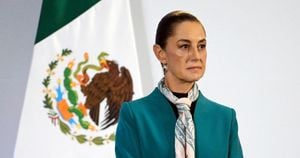The appointment of Robert F. Kennedy Jr. as Secretary of Health and Human Services (HHS) under President-elect Donald Trump is generating considerable concern within the public health sector. Experts warn of the potential detrimental effects his confirmation could have on public health policy, pointing to Kennedy's controversial views on vaccines and his history of promoting conspiracy theories surrounding medicine.
Kennedy's selection has shaken the foundation of health advocacy, especially due to his extensive criticisms of the pharmaceutical industry and his longstanding skepticism toward vaccines. Known for his nonprofit organization, Children’s Health Defense, he has spread misinformation about vaccines, questioning their safety and efficacy. If confirmed, he could wield enormous influence over major public health initiatives and the nation’s vaccine policies.
Given his past declarations, the fear among health experts revolves around Kennedy’s potential to undermine long-standing vaccine recommendations, which have historically played a pivotal role in preventing outbreaks of diseases. According to public health professionals, if Kennedy were to revise the vaccination schedule or delay the development of new vaccines, it could endanger public health and increase the spread of preventable diseases.
A notable example of Kennedy’s rhetoric against vaccinations occurred during the measles outbreak in Samoa, where he implied vaccination failures were at fault rather than the actual spread of infection, generating unnecessary panic and contributing to distrust about public health measures.
His opposition to pharmaceutical advancements extends beyond vaccines. With the burgeoning popularity of weight-loss drugs like Ozempic, Kennedy has highlighted the need for nutritional approaches rather than pharmacological ones. He argues against the processed food industry, advocating instead for reforms to make healthy eating more accessible and prioritized. Following Kennedy’s nomination, stocks for major pharmaceutical companies, especially those producing weight-loss drugs, took significant hits as investors reacted to the uncertainty surrounding their future operations.
His plan under the “Make America Healthy Again” initiative includes not just measures against pharmaceutical companies but also proposed changes to historical health frameworks. He has signaled intent to clean up alleged corruption within federal health agencies, challenging the existing norms around dietary guidelines and focusing on the promotion of whole foods.
Industry experts are split on what his ascension to the HHS might mean. Some believe it could encourage greater investment and interest among startups focused on functional medicine approaches, as illustrated by the immediate outreach from venture capitalists to companies centered around healthy diets after Kennedy's nomination. This growth spurt highlights the simultaneous tug-of-war between advancing nutrition and the established interests of pharmaceutical giants.
His potential leadership could embolden startups like FarmboxRx, which promotes healthy food deliveries and educational resources for consumers, possibly accelerating investment within the food-as-medicine sector. This paradigm reflects Kennedy’s commitment to incentivize healthy eating and battle chronic disease through nutrition.
Despite these positive prospects within the alternative health industry, the ramifications of Kennedy’s vaccine-related policies could result not only in diminished vaccination rates but also actions affecting the Food and Drug Administration’s (FDA) vaccine approval processes. Experts predict he could influence the FDA to impose stricter regulations on vaccine research, resulting in prolonged approvals and distinctly impacting responses to future health crises.
During his tenure, Kennedy could advocate for heightened awareness of vaccine side effects. While emphasizing the importance of transparency, he risks inadvertently amplifying fears about vaccinations, which have proven effective at controlling infectious diseases. This focus could lead to increased hesitancy, especially among populations already wary of immunization.
Further, experts have suggested he could re-evaluate policies granting liability protections to vaccine manufacturers, a move likely to deter companies from producing new vaccines. Historically, these protections have been pivotal for encouraging pharmaceutical investment and innovation within vaccine development.
The position of HHS Secretary allows the holder to steer national health policies and direct federal agencies, such as the CDC and the FDA, which have been instrumental in managing health crises, including the COVID-19 pandemic. Therefore, Kennedy's confirmation may lead to significant changes within these organizations, impacting everything from immunization schedules to the very nature of health communications.
While Kennedy claims he does not intend to remove vaccines from the market, many worry about the potential changes he might implement — ones which could weaken public trust and worsen health outcomes across various demographics. Experts voice concerns about his influence over public health responses potentially staving off scientific advancements and delaying necessary public interventions.
With the mounting pressures surrounding his nomination, it’s clear the political and health landscapes will be watching Kennedy closely. If confirmed, he is poised to lead initiatives during one of the most consequential times for American public health, with significant ideological divides shaping the debates on health policy.
Public health experts fear the impacts of Kennedy's appointment extend far beyond just his policies; they encapsulate broader societal skepticism around vaccines, health agencies, and pharmaceutical companies. The ramifications could fundamentally reshape public health advocacy and patient trust at large. Only time will reveal how the political currents will influence public health decisions moving forward.



